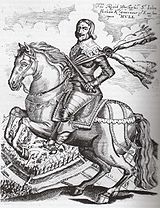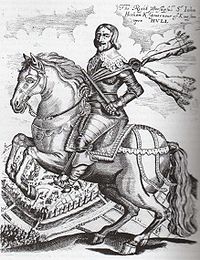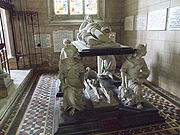
John Hotham
Encyclopedia
- This article is about John Hotham the elder, for his son see John Hotham the youngerJohn Hotham the youngerSir John Hotham the younger was the eldest son of John Hotham and an English Member of Parliament during the civil war....
.


England
England is a country that is part of the United Kingdom. It shares land borders with Scotland to the north and Wales to the west; the Irish Sea is to the north west, the Celtic Sea to the south west, with the North Sea to the east and the English Channel to the south separating it from continental...
parliament
Parliament of England
The Parliament of England was the legislature of the Kingdom of England. In 1066, William of Normandy introduced a feudal system, by which he sought the advice of a council of tenants-in-chief and ecclesiastics before making laws...
arian, belonged to a Yorkshire
Yorkshire
Yorkshire is a historic county of northern England and the largest in the United Kingdom. Because of its great size in comparison to other English counties, functions have been increasingly undertaken over time by its subdivisions, which have also been subject to periodic reform...
family, and fought on the continent of Europe during the early part of the Thirty Years' War
Thirty Years' War
The Thirty Years' War was fought primarily in what is now Germany, and at various points involved most countries in Europe. It was one of the most destructive conflicts in European history....
.
In 1622 he was made a baronet
Baronet
A baronet or the rare female equivalent, a baronetess , is the holder of a hereditary baronetcy awarded by the British Crown...
. He was Member of Parliament for Beverley
Beverley (UK Parliament constituency)
Beverley has been the name of a parliamentary constituency in the East Riding of Yorkshire for three separate periods. From medieval times until 1869, it was a parliamentary borough, consisting solely of the market town of Beverley, which returned two Members of Parliament to the House of Commons...
in the five parliaments between 1625 and 1640, and High Sheriff of Yorkshire
High Sheriff of Yorkshire
The High Sheriff of Yorkshire was an ancient High Sheriff title originating in the time of the Angles, not long after the invasion of the Kingdom of England, which was in existence for around a thousand years. A list of the sheriffs from the Norman conquest onwards can be found below...
in 1634. In 1639 he was deprived by the king of his office of governor of Hull
Kingston upon Hull
Kingston upon Hull , usually referred to as Hull, is a city and unitary authority area in the ceremonial county of the East Riding of Yorkshire, England. It stands on the River Hull at its junction with the Humber estuary, 25 miles inland from the North Sea. Hull has a resident population of...
, and joining the parliamentary party, he refused to pay ship-money. In January 1642 Hotham was ordered by the parliament to seize Hull, where there was a large store of munitions of war; this was at once carried out by his son (John Hotham the younger
John Hotham the younger
Sir John Hotham the younger was the eldest son of John Hotham and an English Member of Parliament during the civil war....
). Hotham snr took command of Hull and in April 1642 refused to admit Charles I
Charles I of England
Charles I was King of England, King of Scotland, and King of Ireland from 27 March 1625 until his execution in 1649. Charles engaged in a struggle for power with the Parliament of England, attempting to obtain royal revenue whilst Parliament sought to curb his Royal prerogative which Charles...
to the town. Later he promised his prisoner, Lord Digby
George Digby, 2nd Earl of Bristol
George Digby, 2nd Earl of Bristol was an English politician who sat in the House of Commons from 1640 until 1641 when he was raised to the House of Lords...
, that he would surrender the town to the king, but when Charles appeared again he refused a second time and drove away the besiegers.
Meanwhile the younger Hotham was taking an active part in the Civil War
English Civil War
The English Civil War was a series of armed conflicts and political machinations between Parliamentarians and Royalists...
in Yorkshire
Yorkshire
Yorkshire is a historic county of northern England and the largest in the United Kingdom. Because of its great size in comparison to other English counties, functions have been increasingly undertaken over time by its subdivisions, which have also been subject to periodic reform...
and Lincolnshire
Lincolnshire
Lincolnshire is a county in the east of England. It borders Norfolk to the south east, Cambridgeshire to the south, Rutland to the south west, Leicestershire and Nottinghamshire to the west, South Yorkshire to the north west, and the East Riding of Yorkshire to the north. It also borders...
, but was soon at variance with other parliamentary leaders, especially with Lord Fairfax
Ferdinando Fairfax, 2nd Lord Fairfax of Cameron
Ferdinando Fairfax, 2nd Lord Fairfax of Cameron , English parliamentary general.-Early life:He was born in Yorkshire the eldest son of Thomas Fairfax, whom Charles I in 1627 created Lord Fairfax of Cameron in the Peerage of Scotland and received a military education in the Netherlands. Two of his...
and his son Sir Thomas Fairfax
Thomas Fairfax, 3rd Lord Fairfax of Cameron
Thomas Fairfax, 3rd Lord Fairfax of Cameron was a general and parliamentary commander-in-chief during the English Civil War...
, and complaints about his conduct and that of his troops were made by Oliver Cromwell
Oliver Cromwell
Oliver Cromwell was an English military and political leader who overthrew the English monarchy and temporarily turned England into a republican Commonwealth, and served as Lord Protector of England, Scotland, and Ireland....
and by Colonel John Hutchinson
John Hutchinson (Colonel)
Colonel John Hutchinson was one of the Puritan leaders, and a prominent Roundhead in the English Civil War to the extent of being the 13th of 39 Commissioners to sign the death-warrant of King Charles I.-Biography:...
. Soon both the Hothams were corresponding with the Earl of Newcastle
William Cavendish, 1st Duke of Newcastle
William Cavendish, 1st Duke of Newcastle-upon-Tyne KG KB PC was an English polymath and aristocrat, having been a poet, equestrian, playwright, swordsman, politician, architect, diplomat and soldier...
, and the younger one was probably ready to betray Hull; these proceedings became known to Parliament, and in June 1643 father and son were captured and taken to London
London
London is the capital city of :England and the :United Kingdom, the largest metropolitan area in the United Kingdom, and the largest urban zone in the European Union by most measures. Located on the River Thames, London has been a major settlement for two millennia, its history going back to its...
.
After a long delay they were tried by court-martial
Court-martial
A court-martial is a military court. A court-martial is empowered to determine the guilt of members of the armed forces subject to military law, and, if the defendant is found guilty, to decide upon punishment.Most militaries maintain a court-martial system to try cases in which a breach of...
, were found guilty and were sentenced to death. The younger Hotham was beheaded on 2 January 1645, and in spite of efforts made by the House of Lords
House of Lords
The House of Lords is the upper house of the Parliament of the United Kingdom. Like the House of Commons, it meets in the Palace of Westminster....
and the Presbyterians to save him, the elder suffered the same fate on the following day. Sir John Hotham had two other sons who were persons of some note:
- Charles HothamCharles Hotham (rector)Charles Hotham was an English cleric.Charles Hotham was the son of Sir John Hotham, Governor of Hull. He was educated at Westminster School and Christ's College, Cambridge, where he gained his MA in 1639. He became a fellow of Peterhouse, Cambridge in 1640, but was deprived by parliament of his...
(1615 – c. 1672), rector of WiganWiganWigan is a town in Greater Manchester, England. It stands on the River Douglas, south-west of Bolton, north of Warrington and west-northwest of Manchester. Wigan is the largest settlement in the Metropolitan Borough of Wigan and is its administrative centre. The town of Wigan had a total...
, a Cambridge scholar and author of Ad philosophiam Teutonicam Manuductio (1648) - Durant Hotham (1617–1691), who wrote a Life of Jakob Boehme (1654).

